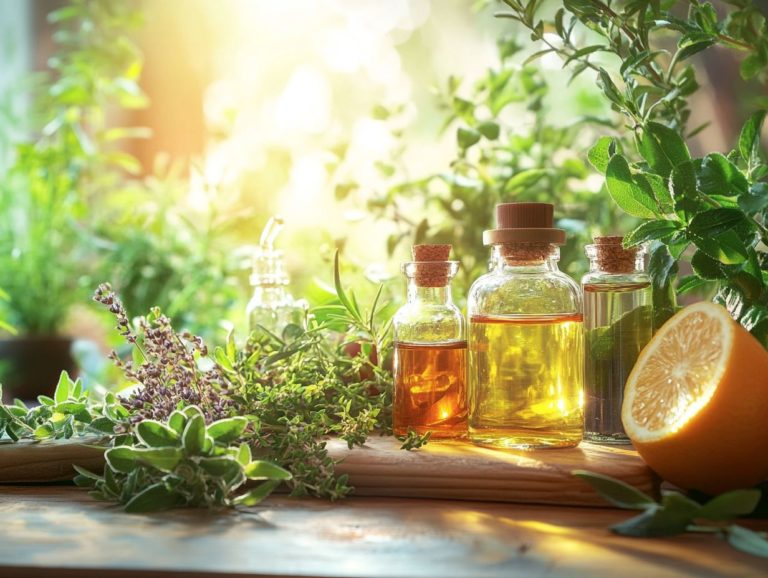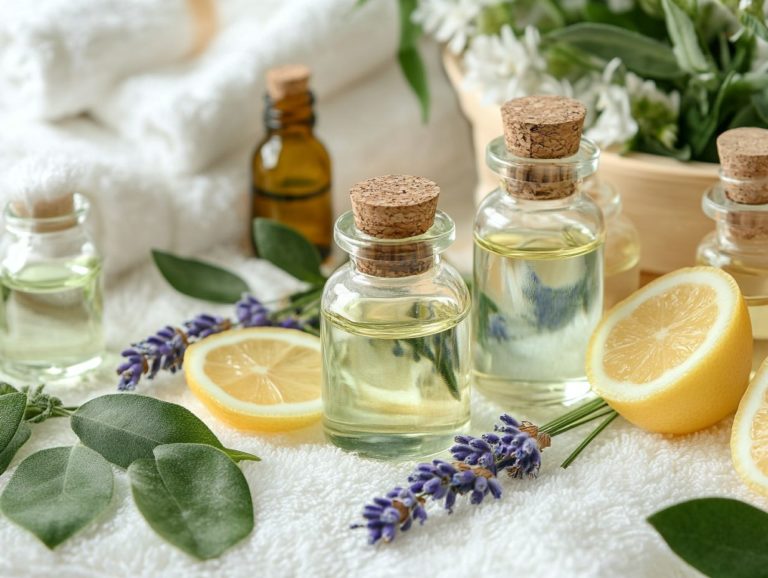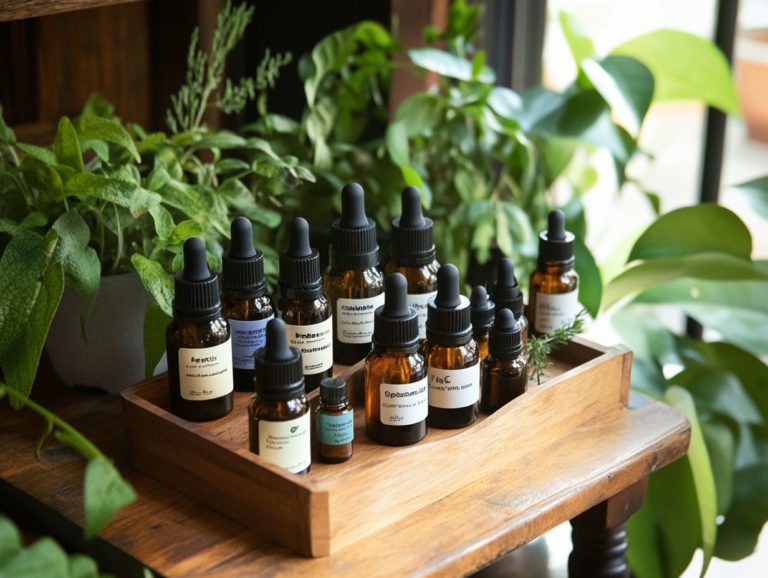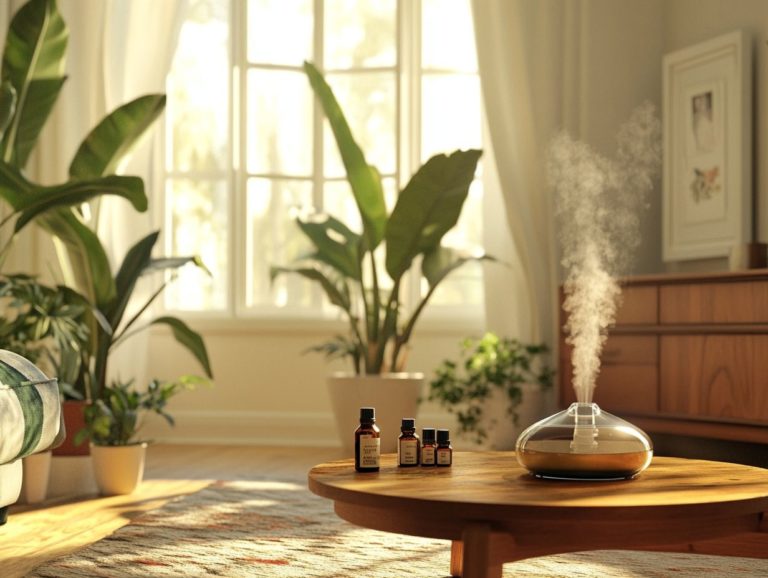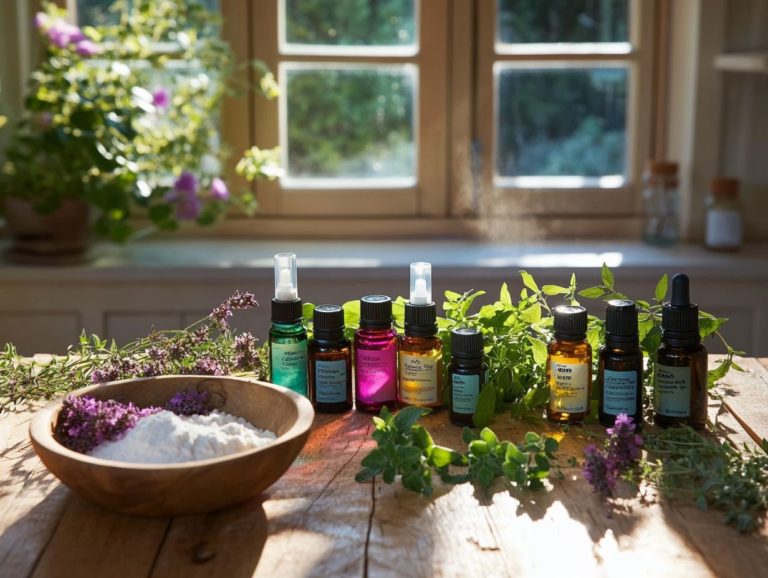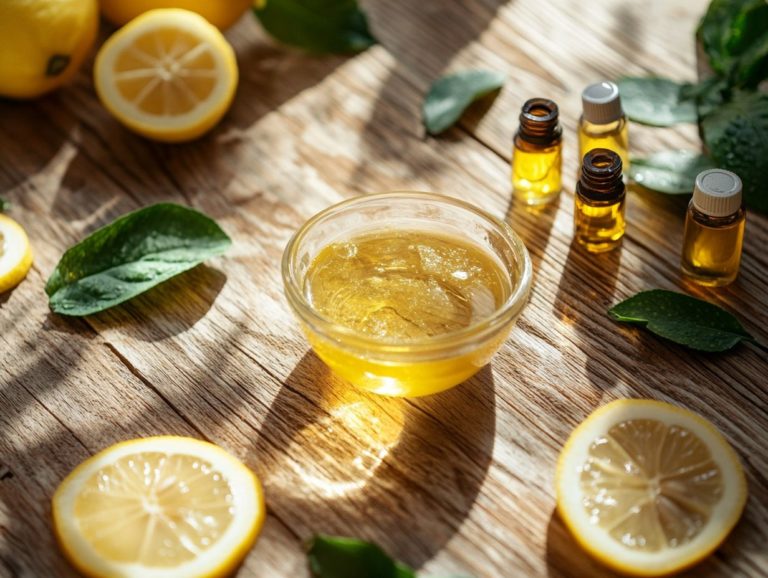Essential Oils for Cleaning: An Introduction
Essential oils have emerged as sought-after natural alternatives to conventional cleaning products, combining effectiveness with delightful fragrances and antimicrobial properties.
In this article, you will delve into the world of essential oils. You ll discover how they can be harnessed for a variety of cleaning purposes, from disinfecting surfaces to refreshing the air in your home. You ll explore the numerous benefits these natural cleaners offer, identify the best essential oils for your cleaning tasks, and receive valuable tips on how to use them effectively through DIY recipes and essential oil combinations.
The article highlights potential risks and precautions when using essential oils to ensure you approach your cleaning routine with confidence.
Get ready to unleash the power of nature in your cleaning routine it s time to elevate your space with the goodness that essential oils, such as lavender oil, eucalyptus oil, and lemon oil, can provide!
Contents
- Key Takeaways:
- What are Essential Oils?
- How are Essential Oils Used for Cleaning?
- What are the Benefits of Using Essential Oils for Cleaning?
- Which Essential Oils are Best for Cleaning?
- How to Use Essential Oils for Cleaning?
- Are There Any Risks or Side Effects of Using Essential Oils for Cleaning?
- Frequently Asked Questions
- 1. What are essential oils and why are they useful for cleaning?
- 2. How do I use essential oils for cleaning?
- 3. Which essential oils are best for cleaning?
- 4. Are essential oils safe to use for cleaning?
- 5. Can I use essential oils for cleaning in place of conventional cleaning products?
- 6. How can I incorporate essential oils into my cleaning routine?
Key Takeaways:
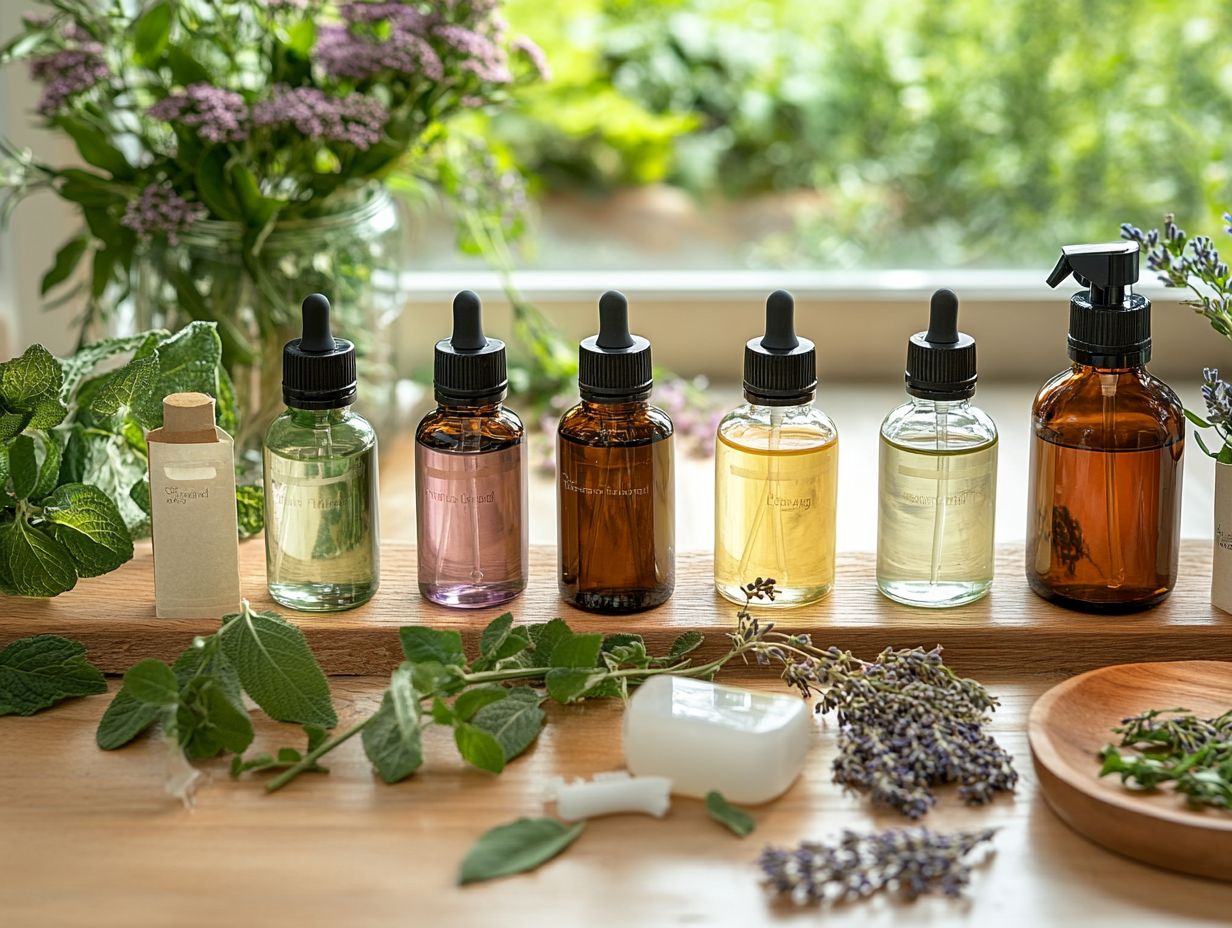
- Essential oils are natural extracts from plants that can be used as cleaners, disinfectants, and air fresheners.
- Using essential oils for cleaning has many benefits, including being non-toxic and chemical-free, providing a pleasant aroma, and being cost-effective and versatile.
- Some of the best essential oils for cleaning include lemon, tea tree, lavender, peppermint, eucalyptus, and thyme oil. Dilution ratios and methods of application should be followed for safe use.
What are Essential Oils?
Essential oils are concentrated extracts sourced from various parts of plants think leaves, flowers, bark, and roots renowned for their powerful aromatic properties and wide-ranging applications.
These natural solutions have surged in popularity lately, thanks to their remarkable health benefits, which span from elevating your skincare routine to bolstering your immune system and promoting anxiety reduction.
In the United States, the demand for pure essential oils is on the rise, as you and many others increasingly search for alternatives to conventional cleaning products filled with harsh chemicals, opting instead for non-toxic environments that foster health and wellness and promote a sustainable economy.
How are Essential Oils Used for Cleaning?
Essential oils have become a sought-after option for cleaning, offering natural alternatives to conventional household products. With their robust antimicrobial and antibacterial properties, oils like lavender, eucalyptus, and lemon give you the power to cultivate a non-toxic environment that s safe for both your family and pets.
Furthermore, by incorporating essential oils into your DIY cleaning recipes, you not only elevate the cleaning experience but also promote health and wellness in a sustainable manner. Consider using popular essential oil brands to ensure you get the best quality.
1. Essential Oils as Natural Cleaners
Essential oils are gaining momentum as effective natural cleaners, celebrated for their powerful cleaning properties and delightful aromas. If you’re aiming to eliminate toxic chemicals from your home, essential oils are a fantastic choice. Oils like lemon and tea tree can be mixed with staples such as baking soda and white vinegar to craft potent DIY cleaning solutions that do more than just clean they also contribute to your well-being by reducing anxiety and enhancing your mood. For pet care, make sure to use pet-safe essential oils to avoid any negative effects.
Take lemon oil, for example; its antibacterial properties make it a superb option for sanitizing kitchen countertops and cutting boards. When you mix lemon oil with baking soda and water, you create a fantastic scrubbing paste that can tackle even the most stubborn stains. On the flip side, tea tree oil is renowned for its antifungal and antiviral benefits, making it perfect for disinfecting bathrooms and laundry alike.
Don’t hesitate to experiment with essential oil blends mixing lavender and eucalyptus can elevate your cleaning routine while promoting relaxation and supporting respiratory health. Dive into the realm of DIY cleaning solutions and discover how these natural ingredients can help you maintain a clean and healthy home environment. Remember to store your essential oils properly to maintain their efficacy.
2. Essential Oils as Disinfectants
Using essential oils as disinfectants is an effective and eco-friendly approach to combat germs and bacteria in various environments. This method promotes a healthier living space.
Essential oils like eucalyptus and lavender boast remarkable germ-fighting and antibacterial properties. They are ideal for sanitizing surfaces while avoiding the harsh chemicals often found in conventional cleaning products.
Incorporating these potent oils into your everyday cleaning routine is easy. You can create homemade sprays or add a few drops to your mop water. For instance, tea tree oil is known for its effectiveness against bacteria like E. coli and S. aureus, which are common bacteria that can cause illness. This makes it an excellent choice for kitchen and bathroom surfaces.
You can enhance your disinfecting efforts by mixing vinegar with a few drops of essential oil. Also, consider using aloe vera for natural solutions in your cleaning recipes.
The natural fragrances of these oils enhance your cleaning experience, leaving behind not just sanitized spaces but also delightful aromas. Compared to chemical disinfectants, essential oils are a safer choice, especially in households with pets and small children, thus enhancing both safety and well-being.
3. Essential Oils as Air Fresheners
Essential oils can elevate your space as natural air fresheners, providing a delightful alternative to conventional fragrances often packed with synthetic chemicals. By embracing the aromatic wonders of essential oils like citrus or peppermint, you can enhance your mood and cultivate a pleasant atmosphere without sacrificing your health.
These natural scents not only lift your spirits but also promote relaxation. They are perfect for spaces such as your living room, bedroom, or any cozy corner of your home. A fantastic way to infuse your surroundings with these inviting aromas is through diffusers, which disperse essential oils into the air, creating a soothing ambiance.
For a quick air freshening solution, consider whipping up a simple homemade spray by mixing distilled water with a few drops of your favorite essential oils. This easy approach helps you avoid the harsh chemicals typically found in commercial air fresheners, allowing you to breathe easier and enjoy a more tranquil living environment.
What are the Benefits of Using Essential Oils for Cleaning?
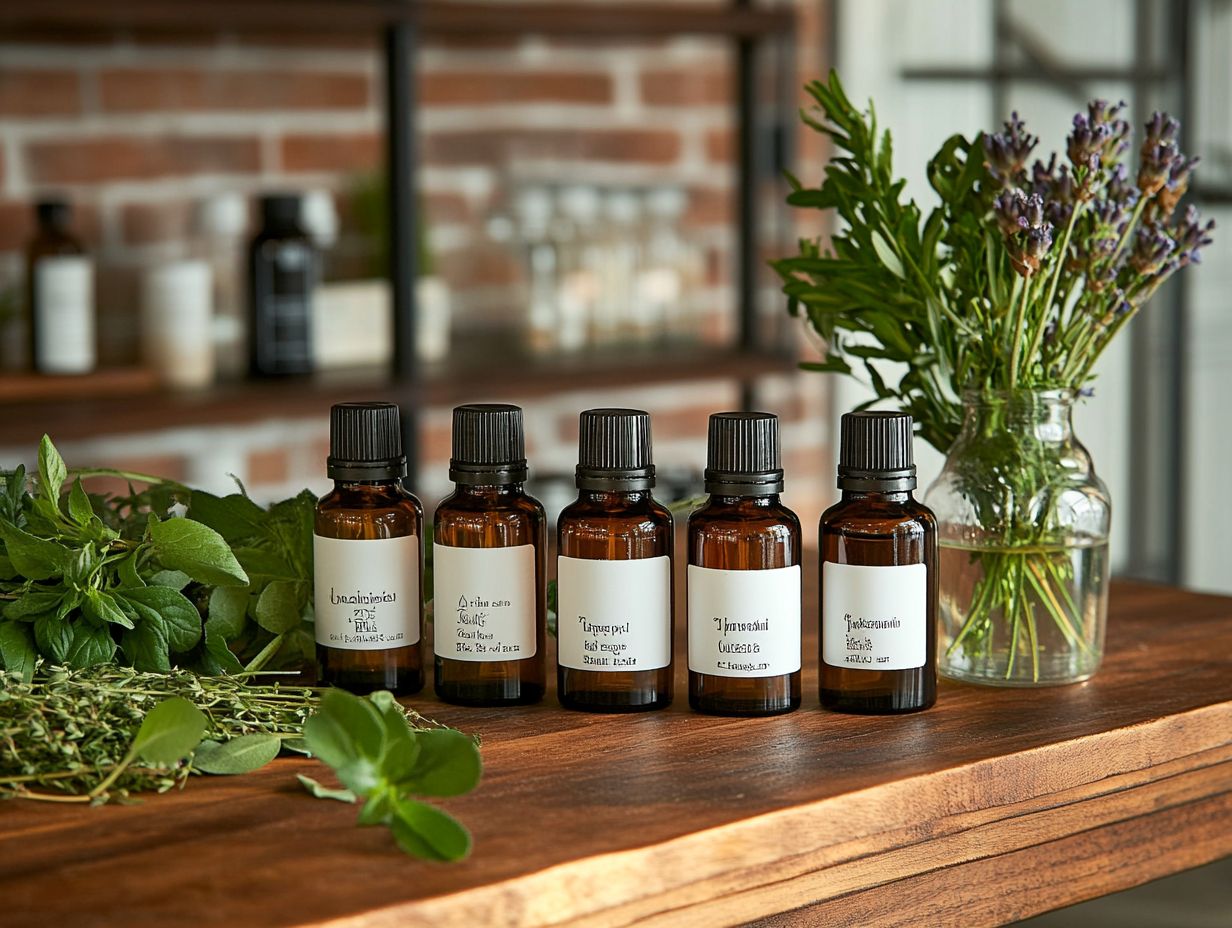
The benefits of incorporating essential oils into your cleaning routine are remarkable. Not only do they foster a non-toxic environment, but they also offer a wealth of health benefits.
By choosing essential oils, you can enjoy the therapeutic effects of delightful aromas, boost your immune support, and achieve impressive cleaning results all without the downsides linked to conventional cleaning products filled with harmful chemicals. Essential oils provide a fantastic alternative to harsh chemical ingredients, promoting a safer home environment.
The versatility of essential oils allows you to use them for a wide range of cleaning tasks, making them a smart and cost-effective option for those who prioritize eco-friendliness.
1. Non-Toxic and Chemical-Free Cleaning
One of the most compelling benefits of using essential oils for cleaning is their ability to create a non-toxic, chemical-free environment. This effectively safeguards your health and the well-being of your family.
Replacing conventional cleaning products with essential oils can significantly reduce your exposure to harmful chemicals that may lead to various health issues. You can still achieve remarkable cleaning results.
These natural alternatives deliver a pleasant aroma that enhances your space and promotes a sense of well-being. Popular essential oils like tea tree oil, known for its antibacterial properties, and lemon oil, which naturally disinfects and keeps your home safe, can easily replace harsh chemicals in your cleaning routine.
Incorporating these oils into your daily cleaning rituals is simple. Just a few drops mixed with water in a spray bottle create an effective and fragrant all-purpose cleaner. By opting for non-toxic methods, you not only protect your health but also contribute positively to the environment.
Switch to essential oils today for a healthier home!
2. Pleasant Aroma and Therapeutic Effects
The delightful aroma of essential oils can transform your cleaning experience, offering therapeutic benefits that uplift your mood and alleviate anxiety. By incorporating essential oils into your cleaning routines, you create a soothing atmosphere in your home while actively promoting health and wellness.
Imagine weaving essential oils like lavender, eucalyptus, and citrus into your daily chores; suddenly, mundane cleaning tasks become a mindful and rejuvenating ritual. Lavender, with its calming properties, is perfect for easing stress as you tidy up. Eucalyptus offers a refreshing scent that invigorates your senses and clears your mind. Bright citrus oils like lemon and orange not only leave surfaces sparkling clean but also lift your spirits, instilling a sense of joy and vitality.
By thoughtfully integrating these delightful aromas into your cleaning products, you can transform your environment, fostering not just cleanliness but also an overarching sense of well-being and balance in your daily life.
3. Affordable and Versatile
Essential oils emerge as a remarkably affordable and versatile solution for your cleaning needs, allowing you to create a wide array of natural cleaners and cleaning products right in your own home with simple DIY recipes. With just a handful of essential oils, you can craft an impressive selection of cleaning solutions for every nook and cranny, all while maximizing your cleaning budget and minimizing waste.
These natural extracts fill your space with delightful aromas and boast antimicrobial and antibacterial properties, making them exceptional choices for disinfecting surfaces. For example, blending tea tree and lavender oils delivers an effective clean for your countertops. A mixture of lemon oil and white vinegar becomes a powerful window cleaner. You can even whip up an all-purpose cleaner using water, witch hazel, and eucalyptus oil, presenting an eco-friendly, non-toxic cleaning alternative to those harsh commercial cleaners.
This savvy approach curtails chemical exposure and toxic chemicals while allowing you to revel in the versatility of essential oils across various cleaning applications. It promotes a sustainable economy and a nontoxic environment.
Which Essential Oils are Best for Cleaning?
Exploring the best essential oils for cleaning can lead you to discover their numerous health benefits and aromatic properties.
When selecting the best essential oils for cleaning, a few options rise above the rest, thanks to their distinctive properties and effectiveness across a range of cleaning tasks. You might find yourself drawn to popular choices like:
- Bright citrus oils like lemon and grapefruit, known for their refreshing scents and potent cleaning abilities;
- Lemon essential oil, renowned for its refreshing scent and powerful antibacterial properties;
- Tea tree essential oil, celebrated for its natural disinfecting qualities;
- Lavender essential oil, which not only cleans but also infuses your space with tranquility;
- Peppermint essential oil, known for its invigorating aroma and pest-repelling abilities;
- Eucalyptus essential oil, admired for its cleansing prowess and soothing fragrance.
Each of these oils excels in cleaning and offers delightful aromas and additional health benefits, making them fantastic additions to your cleaning regimen and promoting a healthier environment.
Start incorporating these essential oils today to breathe new life into your cleaning routine and enjoy a fresher, healthier home!
1. Lemon Essential Oil
Essential oil brands often recommend lemon essential oil as a true powerhouse in the cleaning world, celebrated for its potent antibacterial properties that mean it can kill or inhibit the growth of bacteria and natural disinfectant qualities.
Lemon essential oil stands out for its fresh, invigorating aroma that elevates your mood while effectively banishing unpleasant odors and grime. This makes it an essential ingredient in countless DIY cleaning recipes.
Beyond its delightful scent, this oil excels at tackling stubborn stains such as grease and food residues. Incorporating lemon essential oil into your cleaning routine is easy just add a few drops to a spray bottle filled with water to create a versatile all-purpose cleaner. Lemon oil enhances your cleaning without negative effects.
When facing tougher challenges, like removing soap scum in the bathroom, try pairing it with tea tree oil and vinegar for amazing results! This powerful combination amplifies antibacterial properties while enhancing overall cleaning efficacy, ensuring your home sparkles with hygiene and freshness.
2. Tea Tree Essential Oil
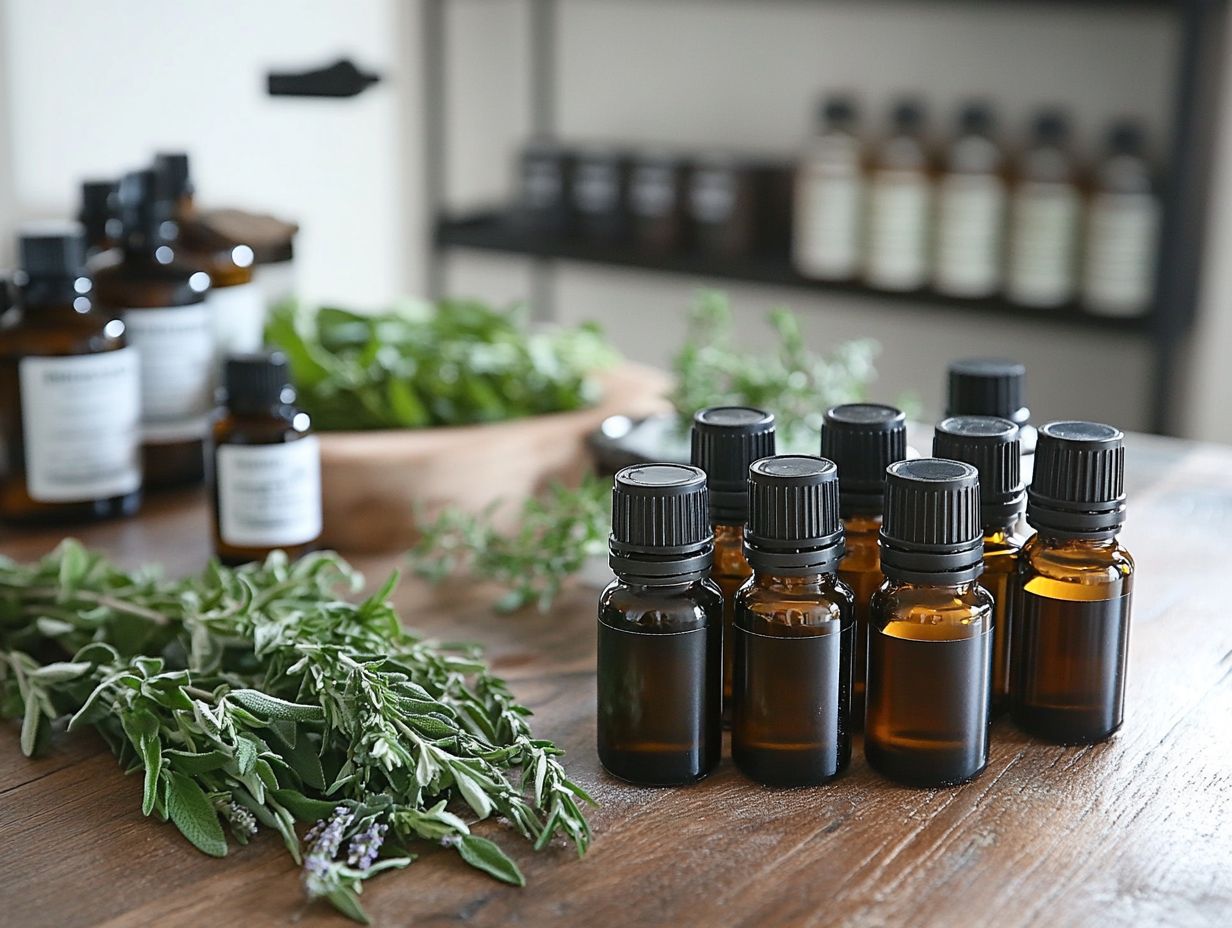
Tea tree essential oil is great at fighting germs, making it a top choice for cleaning and disinfecting surfaces in a non-toxic way. Its versatility extends well beyond cleaning; it also offers health benefits, including immune support and anxiety reduction.
In terms of targeted applications, this essential oil shines in areas frequently exposed to bacteria and mold, such as kitchens, bathrooms, and even laundry. Its natural ability to combat germs and fungi makes it a fantastic addition to your homemade cleaning solutions, ensuring a non-toxic cleaning method.
Create an easy spray for cleaning by mixing tea tree oil with water and a mild detergent. This method ensures a safe and efficient way to maintain a pristine home. It’s crucial to use it correctly; concentrated forms can irritate sensitive skin, so dilution is key to achieving a balanced and effective cleaning experience.
3. Lavender Essential Oil
Lavender essential oil isn t just a pretty scent; it boasts remarkable antibacterial properties that make it a formidable cleaning agent. The soothing aroma can transform your cleaning routine into a delightful experience, enhancing your space and mood.
By incorporating lavender essential oil into your cleaning regimen, you ll not only achieve sparkling surfaces but also infuse the air with a lovely fragrance that lifts your spirits. This versatile oil can blend into various DIY cleaning recipes mix lavender oil with white vinegar to make a powerful all-purpose cleaner or combine it with baking soda to create a gentle scrubbing paste.
For the best results, use lavender oil in spaces like your bedroom or living room, where relaxation is paramount, or in your kitchen to keep a fresh ambiance while cooking. Embracing this aromatic oil in your cleaning routine allows you to maintain a home that feels clean, inviting, and uplifting.
4. Peppermint Essential Oil
Peppermint essential oil captivates with its refreshing aroma and energizing effects, making it a great choice for cleaning products. Its remarkable antibacterial properties boost your cleaning regimen and help repel pests safely.
The crisp and invigorating scent of peppermint uplifts the atmosphere and stimulates your mind, making mundane tasks more enjoyable. Peppermint oil also supports your immune system.
To use this versatile oil, add a few drops to homemade all-purpose cleaners or mix it with white vinegar and water for a natural disinfectant.
You can apply it for freshening up your kitchen counters and banishing odors in bathrooms. For those looking to enhance their cleaning routine, using peppermint oil in laundry can impart a delightful freshness and energy to your garments.
5. Eucalyptus Essential Oil
Eucalyptus essential oil is known for its natural disinfectant properties and soothing aroma. It supports respiratory health, relieves anxiety, and is effective in skin care.
This versatile oil is perfect for combating germs and bacteria, ensuring a clean and healthy home. Use eucalyptus oil to freshen linens and carpets by adding it to washing cycles or diffusing it in the air.
Its invigorating scent not only masks unpleasant odors but also fosters a sense of calm and cleanliness in your living space. With such a wide array of uses, eucalyptus essential oil invites you to unlock its full potential.
How to Use Essential Oils for Cleaning?
When considering how to use essential oils for cleaning, it is essential to be aware of essential oil safety and precautions. This means knowing how to mix them properly and ensuring they are safe for you and your home.
Using essential oils for cleaning necessitates a solid grasp of the proper techniques and methods to truly enhance their effectiveness while prioritizing safety. You’ll want to understand the ideal dilution ratios and select the most suitable application methods.
By integrating essential oils into your cleaning routine, you ll find that it s both simple and satisfying. This method reduces chemical exposure and promotes health and wellness.
1. Dilution Ratio for Cleaning Solutions
Understanding the right dilution ratio for your cleaning solutions is essential for achieving both effectiveness and safety when using essential oils. Typically, a standard dilution ratio involves about 10 to 20 drops of essential oil per ounce of carrier liquid, but this can vary based on the specific cleaning task you’re facing.
For example, when confronting stubborn kitchen grease, you might find that a stronger solution with around 15 to 20 drops is necessary to tackle the grime effectively. In contrast, for everyday surface cleaning, a lighter mixture of about 10 drops should do the trick.
Safety is of utmost importance; some essential oils can lead to skin irritation or sensitivities, making proper dilution all the more critical. A patch test is a way to check how your skin reacts to a new essential oil by applying a small amount on a small area of skin. It s wise to conduct patch tests or start with lower concentrations, adjusting as needed to find what works best for you.
Try different ratios to discover the ideal balance for your unique cleaning challenges, all while enjoying the wonderful benefits of essential oils without the unwanted side effects. It s also crucial to consider essential oil storage to maintain their potency and ensure safety.
2. Methods of Application
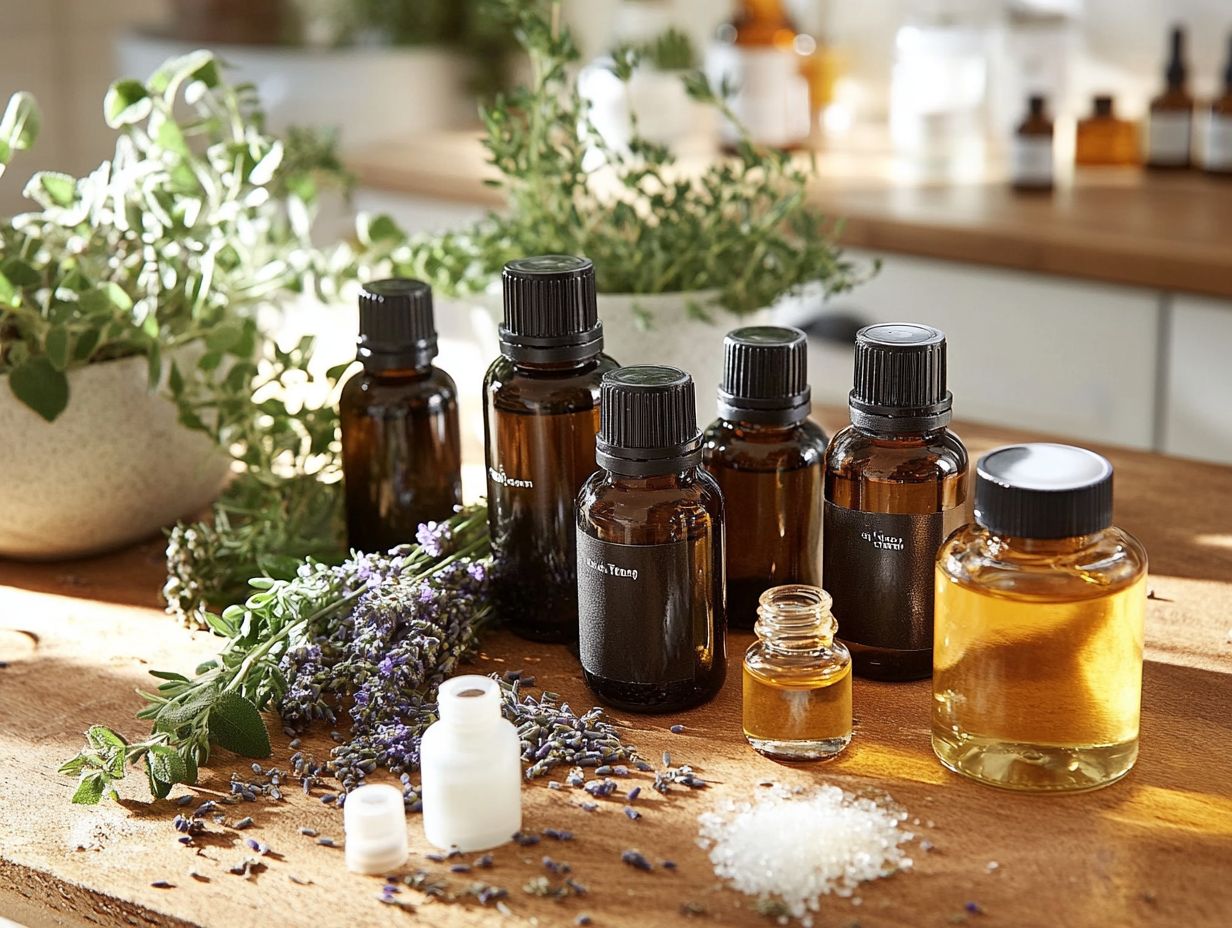
You have a wealth of effective methods at your disposal for incorporating essential oils into your cleaning routine, each one offering unique benefits and versatility. Whether you opt for spray bottles for surface cleaning or diffusers to enhance air quality, grasping these methods can significantly elevate your cleaning outcomes.
Integrating essential oils into your cleaning tasks can transform the mundane into something pleasurable, all while fostering a healthier environment. One popular approach is mixing essential oils with vinegar or baking soda to create powerful all-purpose cleaners. For more detailed information, check out this quick guide to essential oils for cleaning. These concoctions not only tackle grime but also leave behind a delightful, refreshing scent, significantly enhancing your cleaning regimen.
If you enjoy crafting homemade products, consider whipping up your own scrubbing paste with oils like tea tree or lemon; it s an effective way to banish stubborn stains. Plus, using a diffuser not only purifies the air but also enlivens your senses, turning cleaning from a chore into a more enjoyable experience.
Evaluate your specific cleaning needs, as certain oils work better on different surfaces or types of dirt.
Are There Any Risks or Side Effects of Using Essential Oils for Cleaning?
While essential oils can enhance your cleaning routine with their many benefits, be aware of the potential risks that come with using essential oils! Taking appropriate precautions is essential, particularly if you have allergies, sensitivities, or pets in your home.
Concentrated essential oils can lead to skin irritation or allergic reactions if applied directly, so proper dilution becomes paramount. It s wise to conduct a patch test before incorporating a new oil into your cleaning regimen.
For those with pets, vigilance is key, as certain essential oils can be toxic to animals, especially cats and dogs. Consulting a veterinarian before introducing new cleaning products is highly advisable.
Ensuring that your living spaces are well-ventilated while using essential oils can help alleviate any respiratory issues. By staying informed and cautious, you can create a safe and effective cleaning experience that leverages the power of nature.
Frequently Asked Questions
1. What are essential oils and why are they useful for cleaning?
Essential oils come from plants and are very concentrated. They work well for cleaning because they kill germs and bacteria naturally.
2. How do I use essential oils for cleaning?
You can clean with essential oils in many ways. Add them to homemade solutions, dilute with water for a spray, or even mix them with laundry detergent.
They can also be diffused to purify the air and create a fresh scent in your home.
3. Which essential oils are best for cleaning?
Some of the most popular and effective essential oils for cleaning include lemon, tea tree, lavender, peppermint, and eucalyptus. These oils have strong antimicrobial properties and a pleasant scent, making them great for all-purpose cleaning.
4. Are essential oils safe to use for cleaning?
Yes, using essential oils for cleaning is generally safe. Always dilute them and avoid contact with your eyes and skin.
Keep essential oils out of reach of children and pets.
5. Can I use essential oils for cleaning in place of conventional cleaning products?
Essential oils can clean well, but they’re not always enough for tough jobs. Sometimes, you need conventional products too.
Using both essential oils and conventional products can give you the best cleaning results.
6. How can I incorporate essential oils into my cleaning routine?
There are many ways to incorporate essential oils into your cleaning routine. You can add a few drops to your laundry, mix them into your homemade cleaning solutions, or even use them to freshen up your vacuum filter.
Start incorporating essential oils into your routine today and enjoy a fresher, cleaner home!

